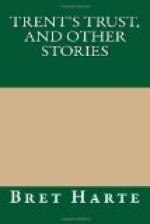“This—er—unexpected visit,” began Miss Tish—“not previously arranged by letter”—
“Which is an invariable rule of our establishment,” supplemented Miss Prinkwell—
“And the fact that you are personally unknown to us,” continued Miss Tish—
“An ignorance shared by the child, who exhibits a distaste for an interview,” interpolated Miss Prinkwell, in a kind of antiphonal response—
“For which we have had no time to prepare her,” continued Miss Tish—
“Compels us most reluctantly”—But here she stopped short. Colonel Starbottle, who had risen with a deep bow at their entrance and remained standing, here walked quietly towards them. His usually high color had faded except from his eyes, but his exalted manner was still more pronounced, with a dreadful deliberation superadded.
“I believe—er—I had—the honah—to send up my kyard!” (In his supreme moments the colonel’s Southern accent was always in evidence.) “I may—er—be mistaken—but—er—that is my impression.” The colonel paused, and placed his right hand statuesquely on his heart.
The two women trembled—Miss Tish fancied the very shirt frill of the colonel was majestically erecting itself—as they stammered in one voice,—
“Ye-e-es!”
“That kyard contained my full name—with a request to see my ward—Miss Stannard,” continued the colonel slowly. “I believe that is the fact.”
“Certainly! certainly!” gasped the women feebly.
“Then may I—er—point out to you that I am—er—waiting?”
Although nothing could exceed the laborious simplicity and husky sweetness of the colonel’s utterance, it appeared to demoralize utterly his two hearers—Miss Prinkwell seemed to fade into the pattern of the wall paper, Miss Tish to droop submissively forward like a pink wax candle in the rays of the burning sun.
“We will bring her instantly. A thousand pardons, sir,” they uttered in the same breath, backing towards the door.
But here the unexpected intervened. Unnoticed by the three during the colloquy, a little figure in a black dress had peeped through the door, and then glided into the room. It was a girl of about ten, who, in all candor, could scarcely be called pretty, although the awkward change of adolescence had not destroyed the delicate proportions of her hands and feet nor the beauty of her brown eyes. These were, just then, round and wondering, and fixed alternately on the colonel and the two women. But like many other round and wondering eyes, they had taken in the full meaning of the situation, with a quickness the adult mind is not apt to give them credit for. They saw the complete and utter subjugation of the two supreme autocrats of the school, and, I grieve to say, they were filled with a secret and “fearful joy.” But the casual spectator saw none of this; the round and wondering eyes, still rimmed with recent and recalcitrant tears, only looked big and innocently shining.




